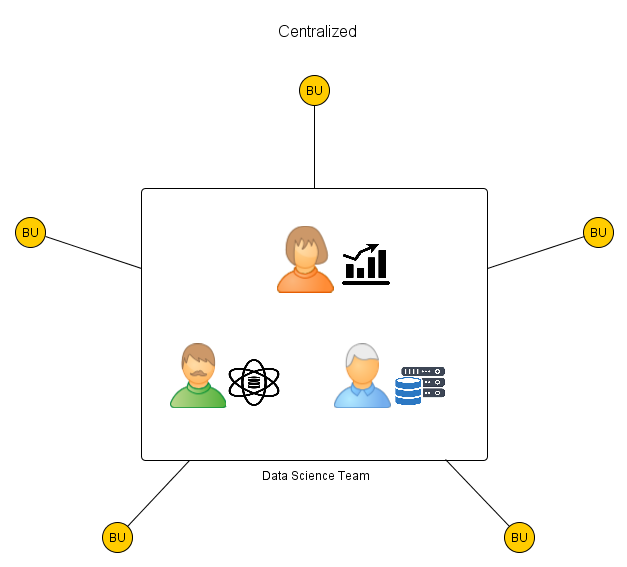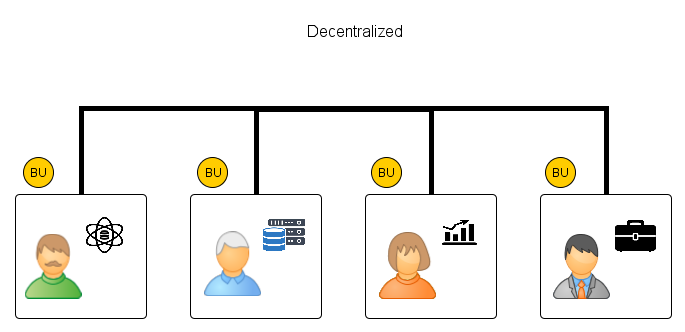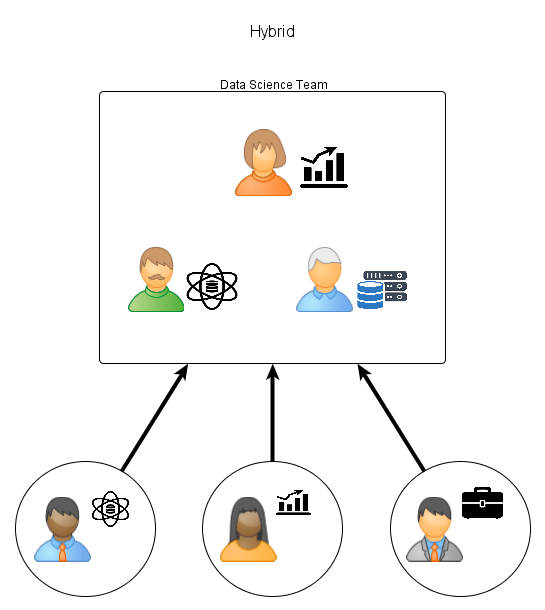In general, there are 3 stages of building a data science team.
- Early Stage
- Mid Stage
- Late Stage (Mature Stage)
For each stage, the team structure of a data science team should be different in order to meet the needs within the business or organization.
Organizational Models
Meanwhile, there are 3 different types of Organizational Models for Data Science Teams and they are:
- Centralized – the data science team functions as a hub and spoke model. They are the central provider of data analytics across different business units.
- Decentralized – each business unit hosts its own small Data Science projects
- Hybrid – there is a centralized data science team; however, there are data science capabilities for each business unit.
During different stages of team development, the organizational model for Data Science team should be changed in order to align the corresponding stage. However, there is a choice to have outsourcing to implement Data Science without internal resources.
Let’s have an overview on each of them:
- Centralized – the Data Science team is the single group of resources providing Analytics to multiple business units within an organization.
- Decentralized – each business unit has its own resources to do data science.
- Hybrid – there is a centralized Data Science team, but Business Units also have Data Sciences capabilities.



Stages of Team Development
The 3 different stages and my suggested team structure for each stage are listed below:
Early Stage
At the early stage, it is suggested to have decentralized model for data analysts working in their own business units. In order words, each business unit may employ their team members focused on data analysis to support the business unit.
The main reason of decentalized model is that it is not feasible for a business to invest a huge amount in Data Science at the early stage. Business owner or top management are willing to have pilot small projects in business units with successful results before further investments.
Pros
Data Science experts, general staff and manager(s) in the Business Unit are sharing the same department goal. Appraisal should be directly related to staff performance and it is easier to maintain the quality of work.
Cons
Some staff may refuse to change or learn new skills within the department. Individuals in different business units may not have enough skill sets to face the new challenges.
Mid Stage
After the team is earning some experience, it is better to have a centralized team structure in order to consolidate the departmental work into “single view of truth”. It is time to have a centralized data repository, such as Data Warehouse or a Data Lake for everyone to access. So, it is better to have the team to report to the top management directly. The top management should make decision while conflicts exist between different business units and/or the centralized data team.
Pros
The data silos could be solved by a single view of truth.
Cons
It is not easy for the centralized data team to communicate with the individual department. For the metadata, it is sometimes extremely difficult to be agreed by different business units.
Late Stage (Mature Stage)
Once the team is being mature, it is time to review whether it is a hybrid team or back to a decentralized team structure. After the historical data of the organization is now available across all departments, different business units should focus on solving their own specific business problems. Thus, it is better to have departmental resources to solve their own problems by better domain knowledge. For the technical skills in Data Science, it is expected staff are developed during the early and mid stage.
Pros
Specific problems are being solved by people with best domain knowledge.
Cons
Internal resources may not able to handle difficult technical issues without external help.
Conclusion
There is no golden rule for the Data Science team building. Any organization may have a different structure of Data Science Team(s). However, the suggestions in this article are based on my experience in Data Analytics for more than 1 decades with the observations and experiences on more than 30 cases.
